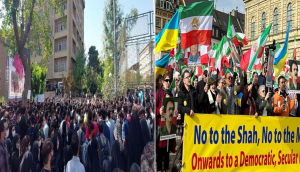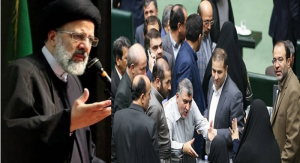(Video) Khamenei Significant Defeat in Upcoming Sham Elections in Iran
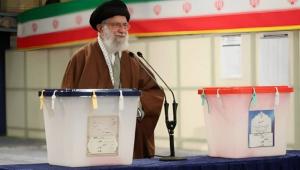
On friday March 1, the Iranian regime is set to conduct sham elections for both its parliament and the Assembly of Experts. Due to Ali Khamenei’s health conditions, there’s a widespread belief that he aims to pave the ground to designate his desired successor.
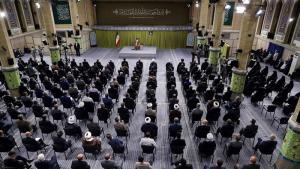
On Jan 3, Khamenei said, “Anyone who opposes elections is opposing the Islamic Republic and Islam, and this move is hostile.”On Dec 23, 2023, Khamenei attacked those discouraging people from participating in elections the enemy’s policy is to sideline people.”
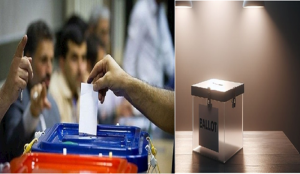
Despite the regime’s extensive manipulation of statistics through an entity known as the “Consolidation of Votes Room,” and the exposure of millions of vote-rigging activities by the IRGC in recent years, the regime confronts an escalating crisis in each election.
With the clear failure of Khamenei's foreign strategy, his domestic vulnerabilities are now becoming more apparent, prompting the need for more decisive action.
Consequently, he has already initiated significant measures to eliminate individuals he perceives as potential obstacles to his plan. Despite these internal purges and the likelihood of further eliminations, Khamenei has paradoxically encouraged insiders to actively participate in the elections, ostensibly to legitimize the system.
On January 9, during a meeting with loyalists in Qom, Khamenei indirectly accused non-participants in elections of aligning with anti-regime sentiments, attributing economic hardships in the country to them. He asserted, “The enemy’s strategic policy is to sideline people. Refusing to turn out in elections aligns with this enemy strategy,” and added, “Wherever they successfully deter people from participating, the enemy prevails.”
On January 3, in another speech, Khamenei said, “Anyone who opposes elections is opposing the Islamic Republic and Islam, and this move is hostile.”
On December 23, 2023, Khamenei attacked those discouraging people from participating in elections, asserting that the absence of elections in Iran would lead to a “dictatorship.”
In Iran, there is systematic coercion of individuals employed in the Islamic Revolutionary Guard Corps (IRGC), the army, the police, and all government agencies, along with their families, to partake in elections.
For those who vote, the Ministry of Interior imprints a stamp on the identity cards. The lack of this stamp can pose challenges in employment, administrative processes, and even military service.
Khamenei extended beyond these actions, rallying all his representatives in different cities during consecutive Friday prayer sermons to both encourage and pressure those reliant on government budgets to participate in elections.
However, despite the regime’s extensive manipulation of statistics through an entity known as the “Consolidation of Votes Room,” and the exposure of millions of vote-rigging activities by the IRGC in recent years, the regime confronts an escalating crisis apparent in each illegitimate election.
In the June 2021 presidential elections, where even the senior advisor to Khamenei, Ali Larijani, was disqualified, Ebrahim Raisi was declared the winner.
With 59,310,307 eligible voters in Iran, the reported participation rate was 48.8%, marking the lowest in the regime’s elections.
However, the most significant aspect was the official registration of three million and seven hundred thousand blank votes, surpassing the votes cast by Raisi’s competitors. This constituted the highest number and percentage of blank votes in the history of the regime’s presidential elections up to that date.
If, as state officials, and particularly Khamenei, assert that mere participation in elections is a measure of legitimacy and support for the government, even the manipulated and engineered statistics suggest that the majority of the Iranian people are rejecting this regime. This leads to the question of how to quantify the silent majority in Iran.
Based on official statistics, 3,425,091 people and unofficial estimates of over 8 million Iranians, which is ten percent of the country’s population, have left their homes to escape repression, terror, and censorship.
According to the Statistical Center of Iran in May 2019, annually, approximately 183,000 Iranians, most of whom are elites, leave Iran under the rule of the Mullahs. Stats from the Migration Policy Institute, suggest that Iranian immigrants in the United States exhibit a significantly higher median household income compared to the broader immigrant and native-born populations.
In June 2022, the Iranian Resistance exposed documents through its network inside the country from the regime’s prison organization, indicating that, excluding the number of political prisoners, over 12 million individuals in Iran have been incarcerated from 1981 to 2022.
According to the unveiled documents, 5,197 individuals were awaiting execution and retribution. Among them, 107 individuals were sentenced to amputation, and in 2020, the sentence of stoning was carried out for 51 individuals, including 23 women. Furthermore, 60 of those executed in 2020 were under the age of 18.
On October 10, 2021, the state-run newspaper Hamdeli reported that the number of prisoners in Iran had multiplied fifteenfold over the past four decades.
Furthermore, there is a significantly noticeable level of dissatisfaction with the economic situation in Iran.
Almost every day, various segments of the population engage in protests due to the loss of their rights. According to sources from the Iranian Resistance, in 2023, over 3,600 protests were recorded, meaning almost 9 protests occurred every day.
According to the official news agency IRNA, women make up 60% of the country’s student population. However, despite the high intellectual representation, misogynist laws in Iran result in more than half of the country’s population experiencing discrimination.
This demographic is considered the largest dissatisfied group in the country, a sentiment that became apparent during their uprising in 2022.
However, more evident and unmistakable than any statistic is the series of uprisings that have swept across the entire country since 2017. The main slogan, “Death to Khamenei,” reflects the people’s relentless demand for profound change.
Decades-long efforts by Khamenei to depict stability within the country collapsed during the 2022 uprising. In reaction to this, Khamenei tried to extend the crisis beyond borders through a proxy war in the Middle East and aimed to secure the regime’s future through extensive purges.
However, with the clear failure of his foreign strategy, his domestic vulnerabilities are now becoming more apparent, prompting the need for more decisive action.
In the 45th year of Iran’s religious dictatorship, Ali Khamenei, the Supreme Leader who has maintained power through a 34-year reign marked by terror and bloodshed, expressed concern about the potential rise of dictatorship.
On December 23, Khamenei stated, “Some criticize the holding of elections, causing frustration. They fail to realize that without elections, the country would face either dictatorship or chaos, turmoil, and insecurity.”
During a meeting with a close-knit group of followers referred to as the people from Khuzestan and Kerman, as per Khamenei’s website, he emphasized, “The terms ‘Republic’ and ‘Islamic’ both rely on elections.
A republic implies rule by the people, where governance is in the hands of the people through elections. Discouraging participation in elections is harmful to the country. The solution to the country’s problems lies in the democratic process of elections.”
Yet, observers of Iran’s unfolding events have discerned Khamenei’s months-long preparation for an extensive purge of the parliament. The Majlis, rigorously vetted four years ago by the Guardian Council, has recently hindered the approval of bills favored by the Supreme Leader and the Raisi government.
In early November, an entity linked to the Ministry of Interior disqualified numerous parliamentary candidates, including dozens of incumbent members, effectively barring them from participating in the upcoming parliamentary sham elections.
Warnings against a nationwide boycott have been issued by numerous officials from previous governments, parliaments, and even rival factions. This sentiment is echoed by segments of society that previously benefited from the regime, revealing a growing disillusionment and a decline in turnout in recent years.
Ali Rabiee, the former Minister of Labor, spokesperson for Hassan Rouhani’s government, and former deputy of the Ministry of Intelligence warned, “Contrary to past periods, as we approach the elections, the level of participation is decreasing.”
Rabiee further elaborated, “The ISPA survey report indicates that 27.9% of the people have stated that they will definitely participate in the elections. 7.4% are likely to participate. 21.9% have not yet decided on their participation. 36% have declared that they will not participate in these elections in any way.
Additionally, 6.8% have expressed a low probability of participating in these elections. By combining those who have definitively expressed their intention to participate with half of those likely to participate, we reach an approximate figure of 32%, which is a more precise number.”
On the other hand, media outlets aligned with the Raisi government are making concerted efforts, utilizing advertisements and featuring previously marginalized figures, to appeal to the so-called voters and boost turnout.
Simultaneously, as the election date draws near, a significant amount of news regarding conflicts among leaders of the three branches as well as their associates in the current parliament is gaining prominence in state-controlled media outlets.
The upcoming parliamentary elections, scheduled for March 1, 2024, are designated to choose representatives for the twelfth term of the regime’s parliament, consisting of 290 representatives serving a four-year tenure. It will coincide with the sham elections for the sixth term of the “Assembly of Experts on Leadership.”
Due to the age and health condition of Ali Khamenei, there is widespread speculation that the next Assembly of Experts will play a pivotal role in determining the future Supreme Leader and consequently, the fate of the regime.
Official announcements from state institutions, which are often criticized for their lack of transparency and accuracy in reporting, indicated a voter turnout of “42.57 percent” in the previous parliamentary elections held on June 18, 2021. This turnout was one of the lowest reported in the past four decades.
In recent years, Khamenei has pursued a strategy of consolidating power by purging numerous members of rival factions, even former allies. This has led to a diminished and more precarious support base for his leadership.
Consequently, the Supreme Leader and his allies are apprehensive that, given the revolutionary sentiments within Iranian society, they will certainly face challenges in rallying support and suppressing dissent, potentially undermining their regime.
There are indications that in the upcoming sham elections, various parties and groups aligned with former presidents Mohammad Khatami and Hassan Rouhani have declared their decision not to nominate candidates.
Yet, despite threats from the ruling faction to exclude him, Hassan Rouhani has announced his candidacy for the Assembly of Experts elections. While cautioning that sidelining him could lead to worse consequences for the regime, Rouhani conveyed to a gathering of clerics on December 23, “Sometimes not voting in the elections is a form of voting.”
During the 2022 uprising, which extended over several months and witnessed widespread protests across Iran calling for the overthrow of the clerical dictatorship, Khamenei addressed the nation publicly more than five times within a few weeks.
He appealed for the support of both current and former officials for his government. However, this unprecedented move was largely disregarded by the highest-ranking authorities.
As Iran’s regime nears its sham parliamentary elections, scheduled for March, the process of purging the key regime figures from running for office has reached a point thateven the regime newspaper Ham-Mihan wrote on January 7, “No news has had as strong a reaction as the disqualification of Seyyed Mahmoud Alavi, the former Minister of Intelligence.
How is it possible that the highest-ranking official of the Ministry of Intelligence, who played a role in confirming or disqualifying candidates in the previous elections, is now disqualified and eliminated from the parliamentary elections?”
On January 4, the spokesperson of the Guardian Council announced the disqualification of 26 members of the current Majlis (parliament) and key figures of the regime, another scandal that is trying hard to purge its ranks from officials that are not completely aligned with the vision of its supreme leader Ali Khamenei.
On January 7, the state-run Arman-e Emrooz Daily quoted Ahmad Alireza Bigi, a member of Majlis who was disqualified, as saying, “I have been a commander of the law enforcement forces in various provinces for years, a deputy of the Judiciary, and I have six years of experience as a governor. It is strange to claim that someone like me does not believe in the Islamic Republic.”
On January 5, Khabar Online quoted Jalal Mahmoud Zadeh, another member of Majlis who has been disqualified, as saying, “Currently, the qualifications of over 40% of Sunni representatives in the Majlis have been rejected by the supervisory committee. In other words, we have 16 Sunni representatives in the Majlis, and they have disqualified six of us.
Now, I am surprised that I have been a member of Majlis for three terms, and for the past 12 years, I have been the head of the Sunni faction in the Majlis. However, the supervisory committee has disqualified me, citing non-compliance with Islam.”
Khabar Online added, “Mahmoud Zadeh, referring to the government’s influence in the qualification process, said: During the protests, I had discussions, including the impeachment of the Minister of Interior and opposition to the proposed Minister of Industries, Mining, and Trade. These discussions led to my disqualification.”
In a meeting with 50 regime loyalists on January 2, regime president Ebrahim Raisi tried to raise encouragement for participating in the elections. However, it became so scandalous that even the participants in this session described it as a show. Despite the previous announcement, the regime’s television refrained from broadcasting it.
In that session, the politician Mohsen Rafsanjani, said, “It seems that these sessions are more ceremonial rather than practical.”
To subscribe weekly Newsletter of NCRI, please use this link. https://bit.ly/3SMgEla
Shahin Gobadi
NCRI
+33 6 61 65 32 31
email us here
In that session, the politician Mohsen Rafsanjani, said, “It seems that these sessions are more ceremonial rather than practical.”
Legal Disclaimer:
EIN Presswire provides this news content "as is" without warranty of any kind. We do not accept any responsibility or liability for the accuracy, content, images, videos, licenses, completeness, legality, or reliability of the information contained in this article. If you have any complaints or copyright issues related to this article, kindly contact the author above.

